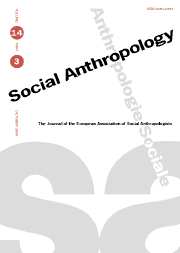No CrossRef data available.
Article contents
Afterword
Published online by Cambridge University Press: 24 February 2006
Abstract
When I had the honour of acting as the discussant at the panel that was at the origin of this collection of essays (at the African Studies Association in Boston, 2004), I was already impressed by the quite surprising ways in which these four texts about different areas were connected. It is, of course, a beautiful quartet, each article making crucial points in its own right. But the special merit of this issue is that the texts complement each other in such seminal ways that, together, they evoke a challenging vista of hidden but none the less global currents in the dark world of the slave trade, tightly connecting the two sides of the Atlantic. In their interconnectedness the texts show that it is possible to follow secret cults and associations from the areas where people were captured to be sold as slaves, through the homelands of their captors, all the way to the other side of the Atlantic. They also show that the ambiguities of these cults and associations offer an optimal vantage point for understanding all the complexities of the slave trade configuration – especially if one wants to try and go beyond the history as passed on by the discourse of those in power (that is, the captors). Apparently the power of the secret and the ways in which it was passed on can offer quite surprising glimpses of the view-from-below, from among those who appeared to have been forced out of history.
- Type
- Research Article
- Information
- Copyright
- Cambridge University Press 2006


